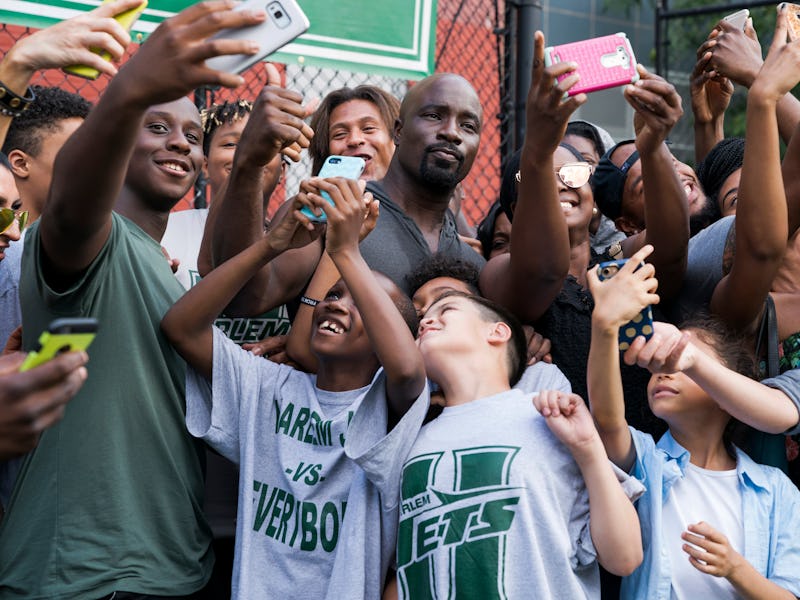'Luke Cage' Season 2 Is Mighty Good, But Can't Power Past Netflix's Limits
The second season of the Marvel/Netflix series is a vast improvement in every way. Almost.

Let’s get something about Luke Cage Season 2 out of the way: No, there isn’t a change of villains halfway through the season. Each plot that begins in the first episode is followed all the way to the last, and if Marvel fans have the patience for a 13-hour journey, they’ll be rewarded with one of the finest, most fun, and emotionally gripping entries in the Marvel/Netflix franchise yet. But through no fault of its own, Luke Cage is also proof the structure of Marvel/Netflix is becoming too unwieldy.
Luke Cage Season 2, premiering on June 22, picks up where The Defenders left off. More than just a free man, Luke (Mike Colter) is now a celebrity, a role model who kids stop for selfies and Nike sponsors look for at Pop’s Barbershop. Aside from busting up the few pockets of crime he deals with, Luke’s biggest concern is making money to keep Pop’s afloat without selling out his principles.
It’s not long before the problems start. In her takeover of Harlem’s Paradise, Mariah Dillard (Alfre Woodard) has aligned with Shades (Theo Rossi), and her ambition to save Harlem is enough to nearly destroy it. Meanwhile, a new villain, Bushmaster (Mustafa Shakir, a revelation whose Jamaican accent is like music even when it’s sinister), seeks vengeance against Mariah.
Soon, Luke is caught in the crossfire of a gang war, fueled by personal vendettas between feuding crime lords. It’s a good thing he’s bulletproof.
Mike Colter returns as Luke Cage in Season 2.
Season 2 of Luke Cage is great. Really great, even. From top to bottom, Season 2 is tighter-paced, yet packed with more action and character depth than Season 1, which banked too hard on great talents like Woodard (who is still great) and Mahershala Ali to keep viewers invested. But Luke Cage still suffers from a case of too much, a recurring symptom of the good health of the Marvel/Netflix franchise.
There are too many supporting characters. Too many alliances and betrayals. And at 13 episodes at an hour apiece, it is just too long to tell a story. This was a bigger problem for Season 2 of Jessica Jones than it is for Luke Cage, but more than once as I watched the season (all 13 episodes were available to the press), I prepared for a finale only to learn I had three or four or five more episodes left. It’s a boring First World Problem, that there are too many things to watch, but to ensure a healthy future for this franchise, a trim is in order.
Despite the Netflix bloat, little of Season 2 truly feels like a drag. It’s more apt to say there are unnecessary detours. In Episode 10, for instance, Luke hangs with Danny Rand (Finn Jones) from Iron Fist, bringing to life the Heroes for Hire team-up fans are waiting for. While the dynamic duo hardly get anything done, you can’t help but have fun the entire time. That’s Luke Cage Season 2’s flaw right there — you’re having fun the entire time, but with a little trimming, it could have been exceptional start to finish.
'Luke Cage' Season 2 is as much about the villains as it is about Luke. Alfre Woodard returns, delivering another stunning performance as Mariah Dillard.
One flaw isn’t enough to scratch Luke Cage. In fact, aside from improvements and its strong cast — including vets like Simone Missick (Misty), guests Jessica Henwick (Colleen Wing), and newcomers like the late Reg E. Cathey as Luke’s father — Season 2 smartly doubles down on the one thing that made Season 1 so interesting: Style.
Unlike Daredevil, a crime noir with ninjas, and Jessica Jones a white feminist detective serial, Luke Cage is an ever-changing mosaic of black cinema, westerns, gangster flicks (spot the most obvious Godfather homage of all time), and kung fu, sometimes all at once. When Bushmaster and Luke meet at high noon, they resemble cowboy gunslingers, but when they fight, it’s live-action Tekken. Spotting these genre references is more fun than catching the very few Easter eggs to the MCU.
There are also specific moments in Season 2 that propose the bold idea that maybe Luke isn’t the role model kids should look up to. I’m eager to hear the conversations the season sparks about what Luke Cage says about masculinity, and what it means for a towering 6-foot-3 black man who has the hubris to believe he’s strong enough to save everyone.
Luke Cage Season 2 goes above and beyond what the compelling but ultimately average Season 1 delivered nearly two years ago. Luke Cage is as much about its hero as it is about Harlem, about the villains who built the city on blood and the victims it belonged to, and the good people who only want a hero to look up to. But there are still chinks to the armor which threaten whether or not this franchise can continue to thrive. In Season 2, Luke is told something repeatedly but refuses to listen: He may be bulletproof, but Harlem isn’t.
Marvel’s Luke Cage Season 2 begins streaming on Netflix on June 22.